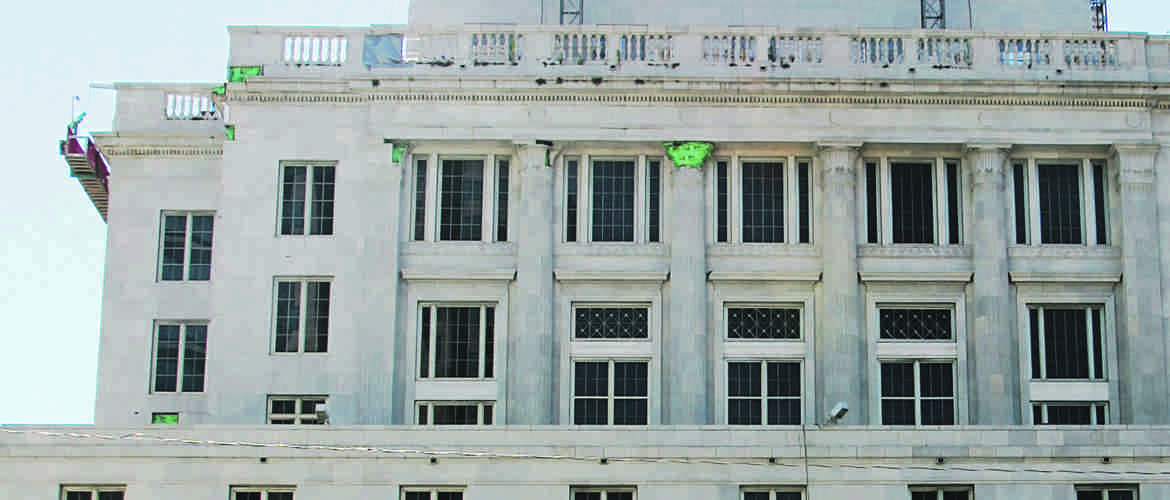By Isheka N. Harrison
Special to South Florida Times
MIAMI — On November 4, when Miami-Dade County voters go to the polls, they will decide whether to support yet another bond referendum, this time for $393 million to fund the building of a new civil courthouse. The current courthouse, located at 73 West Flagler Street, is an historical site that has served Miami-Dade residents since construction was completed in 1928. At the time, there was more than enough room for the seven judges in Miami-Dade County; but that was also almost 90 years ago.
Fast-forward to 2014 where over 41 judges use 23 courtrooms, over 3,600 visitors come through daily and a total of 576 staff work in various capacities throughout the building. With these stats, there’s no debate that the courthouse which was once the only place blacks could go to have their cases heard is overcrowded.
Add to that 10 unusable floors and numerous health and safety hazards – including mold, water intrusion, asbestos, odors, termite infestation and a crumbling infrastructure – and there’s not even a debate about whether a new courthouse is necessary. The debate is about whether taxpayers should fund it and why, all of a sudden, the issue is so urgent.
“People say this is rushed. It is not a new issue. Everyone has known about the need to replace this building. It was a need, now it’s a crisis,” said Chief Judge Bertila Soto of the 11th Judicial Circuit.
Soto, along with her colleague Jennifer Bailey, a Miami-Dade Circuit Judge, and others who support the Building Blocks for Justice campaign have made a compelling case for the bond funding, complete with pictures of hazardous conditions, live tours of the decrepit building and several comprehensive reports dating back to 1986, all which call for the building to be replaced.
However, some Miami-Dade residents are still skeptical about voting yes for a bond that will likely cause an increase in property taxes if approved, particularly since voters have approved bonds worth $830 million for Jackson Health System and $1.2 billion for the public school system since 2012.
“My vote is still up in the air to be honest with you. On the one hand I’m saying let them go ahead and build it because they’re going to build it anyway. On the other hand I’m saying why should we have to pay more tax dollars for something. Anything you’re voting on is coming out of your pocket. That’s the way I look at it. 393 million is a lot of money, but it’s eventually going to get done whether we vote for it or not,” said Geno Ward, a military veteran who has been residing in Miami for almost 40 years.
“I’m for building a new courthouse. It is in bad condition, but I would prefer if the old one could be restored. There is history there and I’m concerned about them demolishing the old courthouse because it will affect people from miles around. How will it affect the health of people around the demolition? Think about the economic impact this will have on the downtown area. People will be out of work and who has to pay, the taxpayers,” said Gwendolyn Walker, a lifelong Miami-Dade County resident.
Judges Soto and Bailey understand the public’s concern, but they estimate that the average household would only be taxed $14 dollars, if that. They confirmed Ward’s comments, saying the bond is the best way to save taxpayers’ money.
“It will be seven to $14 dollars at most per household, if that,” Judge Soto estimated. Since the county doesn’t have any money to fund a new courthouse, if the bond isn’t approved the judges advised that the county may resort to raising the money through other means like increasing fees on traffic tickets.
“The taxpayers are skeptical and we understand that. The bottom line is taxpayers are going to pay for this one way or another. We are trying to provide a cost effective way,” Bailey said.
A structural report published in January 2014 revealed that 132 of the 144 lower floor columns which uphold the courthouse were severely corroded and required $25 million in immediate structural repairs to keep the building in use.
Due to the depth of damage, the Miami-Dade County Commission voted in August, eleven to two, to place the bond question on November’s general election ballot. There are four proposed sites where a new courthouse can be built. Now it’s up to the people to decide.
Before they do, Judge Soto wants Miami-Dade residents to know the campaign for a new courthouse is about more than funding a brand new building; she said it’s about doing what’s right for the courthouse staff and the community.
“It is my moral obligation as a chief judge to bring this to light. Everything that is not a criminal case or family dispute comes to us. We are just as important as the school system and Jackson,” Judge Soto said. “This building was never meant for one million annual visitors. Our flagship courthouse is crumbling. It’s a check that’s going to be way more expensive if it’s not done now.”










No Comment